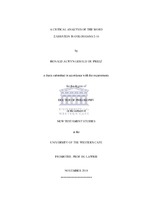| dc.description.abstract | Across the centuries, and especially in the more recent past, the question of the observance
of the weekly Sabbath has been an ongoing matter of discussion and debate among scholars and
Bible commentators of various religious backgrounds, particularly among seventh-day Sabbatarians.
Since the only place that the lexical Greek term óÜââáôá appears in the New Testament, after the
Gospels and the book of Acts, is located in Colossians 2:16, this passage has become the focus of
much attention – more so, since the text seems to suggest that Sabbath-keeping is an optional issue.
Due to the fact that, in both Hebrew and Greek, the basic term for “sabbath” has more than
one possible meaning, the major challenge has surrounded the question as to whether Colossians 2:16
refers to the weekly seventh-day Sabbath (as noted in the decalogue of Exod 20), or to the ceremonial
sabbaths (as in the ritual code of Lev 23:4-37). To a large degree, based on the notion that this epistle
includes an allusion to an oft-occurring trilogy of terms in the Old Testament, a majority of scholars
have concluded that the seventh-day Sabbath is in view here. The minority maintain that the context
shows that Colossians 2:16 is dealing with annual cultic sabbaths, that were fulfilled at the Cross.
Approaching the final form of the canon, from a Protestant perspective, and operating within
the essential principles of the historico-grammatical hermeneutic, this thesis seeks to meticulously
analyze the meaning of óÜââáôá (especially as it appears in the triad of “feast, new moon, sabbath”).
Taking into account the theme and setting of this epistle, it seems there is sufficient contextual, intertextual,
etymological, lexical, linguistic, semantic, syntactical, structural and typological data to
reasonably conclude that the óáââÜôùí of Colossians 2:16 does not refer to the seventh-day Sabbath. | en_US |

